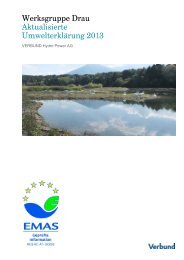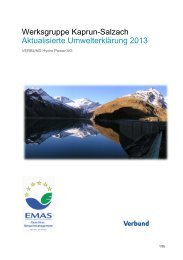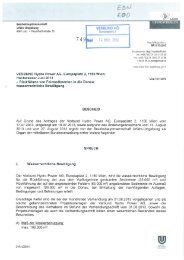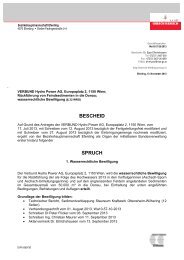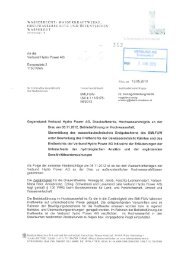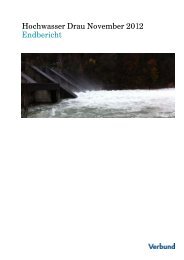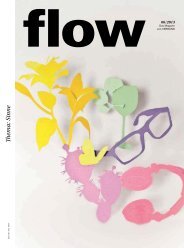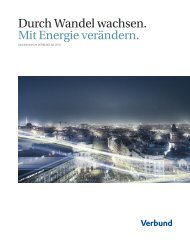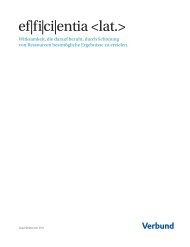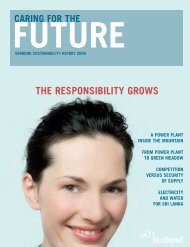Download PDF - Verbund
Download PDF - Verbund
Download PDF - Verbund
You also want an ePaper? Increase the reach of your titles
YUMPU automatically turns print PDFs into web optimized ePapers that Google loves.
specific emissions reduction targets was not achieved at the UN Climate Change Conference in<br />
Copenhagen in December 2009. The climate conference ended with minimal consensus on a political<br />
declaration, which includes a nonbinding target for limiting global warming to two degrees, but does<br />
not contain any specific guidelines for reducing harmful greenhouse gases. It was also agreed that the<br />
industrialised nations would each set their reduction targets and base years at the start of 2010 and that<br />
developing countries would notify the UN every two years of the national measures they are planning<br />
to take to reduce greenhouse gases. In terms of financial support for developing countries, the result of<br />
the conference was pledging $ 30 billion between 2010 and 2013, the establishment of a “Copenhagen<br />
Green Climate Fund” with pledging $ 100 billion a year from 2020, and the introduction of international<br />
measures to monitor this financial aid. A legally binding framework for the creation of a Kyoto follow-up<br />
treaty is now to be drawn up for the next UN climate conference at the end of 2010.<br />
ENERGY STRATEGY FOR AUSTRIA<br />
In March 2010, Austrian Federal Ministers Mitterlehner and Berlakovich outlined the key points of the<br />
Austrian Energy Strategy, as commissioned by the government and overseen by the Federal Ministry of<br />
Economy, Family and Youth and the Federal Ministry of Agriculture, Forestry, Environment and Water<br />
Management since April 2009.<br />
The basis for achieving the energy and climate goals in 2020 is to stabilise energy consumption in Austria<br />
to 2005 levels (1,100 petajoules). This will be achieved by consistently increasing energy efficiency,<br />
expanding renewable energy and ensuring the energy supply long-term.<br />
In the realm of energy efficiency, the focus is on building thermals and lowering energy requirements<br />
of households and companies through energy consulting and energy management. Additionally,<br />
electromobility is a central goal for the efficient use of (primary) energy and lowering emissions.<br />
Experts are also predicting that electrical energy will be required to make an even greater contribution<br />
to the achievement of energy and environmental policy goals in future. Substituting fossil fuels with<br />
electricity will help increase efficiency throughout the energy system.<br />
With regard to expanding renewable energy, the focus is on the potential of hydropower to generate<br />
electricity. By 2015, 3.5 TWh will be generated by small, medium and large plants. Of particular interest<br />
is the significance of expanding pumped storage capacity and transmission and distribution grids to<br />
balance out wind energy, which is also to be increased.<br />
VERBUND’S COURSE<br />
Due to the general economic situation in the wake of the financial crisis, the strategic process took<br />
on particular importance in 2009. As a result, the company has re-evaluated its long-term focus and<br />
continues its development.<br />
The company’s strategic definitions were further developed while the activities and projects necessary for<br />
implementing the strategy were defined together with the operating units. The resulting strategic focus<br />
was consolidated at Group level, incorporated into mid-term planning and will now serve as a guideline<br />
for strict implementation of the Group strategy for the coming years.<br />
<strong>Verbund</strong>’s strategy has a focus on sustainability. This is reflected in the overarching corporate goal<br />
of becoming one of Europe’s largest hydropower generators. Expanding and optimising domestic<br />
hydropower as well as utilizing hydropower competence when investing in major foreign holdings<br />
in France (POWEO), Italy (Sorgenia) and Turkey (EnerjiSA) are the key elements in strategy<br />
implementation.<br />
BUSINESS FRAMEWORK | SUSTAINABILITY REPORT 2009 | 21<br />
VERBUND'S STRATEGIC<br />
PROCESS<br />
VERBUND'S STRATEGY



